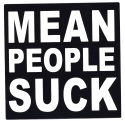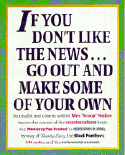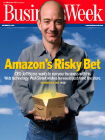
|
||||||||||||||||||||||||||||||||||||||||||||||||||||||||||||||||||||||||||||||||||||||||||||||||||||
But there are exceptions. Today I got an email from Amazon that said something simple that almost everyone likes to hear: Thank you. It's something that Twitter never says. In fact they seem to go out of their way to chase off the people who helped them build their network into the powerhouse that it now is. Much the same way Apple, in 1994, before Jobs came back, was trying to chase off its developers. Every day Twitter does more to tip the table away from the individual and more toward the media industry. Right now there's not much the users can do because there aren't any realistic choices, but if there ever are any, I'm out of there so fast -- don't blink cause all you'll see is a tiny cloud of dust where I used to be. Same way I got off Apple's platform as soon as I could. And who knows, it could happen that Twitter wakes up before they have major competition and decides to do something to glue the users to them. But given the tradition of Silicon Valley of keeping its users at a great distance, I wouldn't bet on it. When I was skiing last week, I was surprised that there weren't any readable Deer Valley trail maps on the web. I promised when I got home I'd scan one and post it. Click on the picture for a full size rendering.
BSG finale, Coraline, the Wizard of Oz
Over the weekend I saw a movie that I really loved, enough to want to call out special attention to it while it's still in the theaters so you can see it. The movie -- Coraline. The plot is Henry Selick's vision of The Wizard of Oz, which coincidentally I have just seen for the first time since I was a child. Both are stories where the central character is a girl who loses her way from home. Both are children's fantasies, and I'm sure Wizard was a marvel of its time, but what a delicious movie Coraline is, for our time. Every morsel is so detailed and filled with satire and irony, yet still taps into the wonder of the child still within all of us. If you've seen it, let me know what you think. If you haven't -- hurry -- while it's still in the theaters. Bill Gates, 1994: "The Internet is a great phenomena. I dont see how the emergence of more information content on a network can be a bad thing for the personal computer industry. Will it cause less personal computers to sell? I think quite the opposite. Less copies of Flight Simulator or Encarta?" PaidContent, 2009: "Microsoft will discontinue both its MSN Encarta reference Web sites as well as its Encarta software, which have both been surpassed by rising competitors, like Wikipedia." I get ideas driving in snow storms
For example -- this morning I left my hotel at 5AM to make a 7AM flight at SLC, to find it had snowed about a foot overnight and my rental car was covered with a huge amount of the stuff. So I wiped off as much as I could with my hands, trying to use the sleeve of my ski jacket as much as possible, but in the process my hands got incredibly cold. Too lazy to dig the gloves out of my ski bag, stuffed with all kinds of stufffff. Now I could see, so I skidded the car across the very wide street to a gas station to fill up, where I used their squeegee to wipe off the remaining snow. Filled up the tank, and drove a few blocks to get on I-80W to the airport. As I was getting on the freeway I realized I didn't have headlights. But I'm now in the middle of a huge cloverleaf, there's no place to pull over, so I decide to risk it, the airport is just a few exits down the highway. As I'm driving I realize now I have a little bit of headlights. Weird! Then a little more and then more, and then finally I realize what happened. When I knocked the snow off, they covered the headlights. This car, a Mercury Marquis, wasn't designed for snow? Anyway it's been a long time since I had a snow driving adventure. I'm sure this will give me some ideas -- what they are -- don't know yet.
Four weeks in a row, the clicking and clacking blogging brothers talk about the reboot of journalism, the news of the week, and a new $1.75 million fund for investigative journalism that Jay is advising. http://mp3.morningcoffeenotes.com/clickClack09Mar29.mp3 Hope you enjoy! Spyware Protect 2009 strikes again Earlier this month my netbook was infected. Yesterday, after checking into my Salt Lake City hotel, I wanted to see if their wired Internet was faster than my Sprint EVDO. So I did a Google search for "speed test" and clicked on the first three tests, Speakeasy, Speedtest and CNET. I wasn't expected to get infected, wasn't even thinking about it, so of course I didn't take notes. But a couple of them came up with empty frames after running their tests. I assumed this was because I had Java turned off. I decided the tests weren't worth the trouble so I just used the EVDO. After a bit of putzing around I went out to dinner. When I came back, there was a familiar malware dialog on the display, warning that my machine had been infected and wanting me to install some software to fix it. Yeah yeah. This time I didn't click any buttons, I just let it keep warning me. I had Avast installed, but a week or so ago I had turned it off, it was too annoying. At that moment of course I wished I hadn't. I ran its scanner, it found the virus, said I had to reboot, which I did, and when it started back up it did a scan of the hard disk, but found nothing further. Then the malware started acting up again. I ran the Avast scan again, and it found it, recommended I reboot, this time I didn't. I did a Google search for "spyware protect 2009" found a Yahoo Answers page that suggested doing what I had started doing, plus running one more program, Superantispyware, which I downloaded, but chose not to run. I remembered from last time that this rootkit virus patches the hosts file, and I didn't trust anything I had downloaded after the infection. (Later I found that it had patched the hosts file, but not for this domain, so the download was likely safe, I trashed it anyway and redownloaded.) I then ran Malwarebytes, it found the virus, asked me to reboot so it could remove it, I did, and this time, no more dialogs. Even so, when I did another scan of Avast, it found the rootkit, and at this point I was beginning to think there was no getting rid of the mess, but it did get rid of it. Another scan by Malwarebytes found nothing, and then Avast found nothing. I ran Superantispyware and it found nothing. So at this point, I'm convinced my machine is clean again, and I have Avast turned on. Lessons learned: 1. Java is not the root of this problem. 2. Both times my machine got infected I was using a speed test site to evaluate the performance of someone else's network. My guess is that it isn't the speed test site, because Google has a pretty strict policy about malware sites, and it seems pretty unlikely they'd point to an infected site on the first page of hits on something so common and important as a network speed test. 3. Using Firefox is no longer a protection against malware, if it ever was. It's now popular enough that the nasty people target it, in addition to MSIE. 4. While I was fighting this I was thinking this is the last time I travel with Windows. But now that things are working again, I don't feel that urgency. Human nature at work!
Today was the best day of skiing in Park City. The sky was clear. It wasn't too warm, and it wasn't brutally cold. When you stopped, breathing hard, the air had a refreshing crispness to it. There was packed powder everywhere. No lift lines. The scenery gorgeous and I was skiing beautifully. It was also the last ski day for this trip. Tomorrow and Sunday I'll hang out in Salt Lake with friends and return to SFO on Monday morning. The ideas kept coming -- one was a meta-idea -- an idea about ideas. It seems we should have an industry retreat at Park City some year, no sessions, no formal meetings, just ski groups, people who ski together, a few hours at a time. It might pump some fresh blood through tech and/or media to do so. Another idea -- a web service that's all about making money and pleasing users and marketers all at the same time. Pretty sure it doesn't exist, so as you're evaluating the idea, don't assume it's just like something you've already seen. Imagine a new Digg-like site where marketers submitted ads. The ones that moved to the top would of course get more views. That would encourage advertisers to learn what viewers liked, if getting more views was one of their goals. At first there would be no cost to placing an ad. But after a time advertisers would pay a flat fee to place their ads on the service, say the cost of running an ad on a non-post-season football game. The great ads would make a lot of money because they would get far more viewers than the not-great ones, but all would pay the same. The people who ran the site would make a fortune, assuming it bootstrapped well. Have I ever seen an ad I liked, one person on Twitter asks. Yes of course. Many. Have you ever watched the Superbowl? The thing is that ads don't have to be bad, they can be funny, interesting, informative, inspirational, and sometimes so good you can't help but watch them over and over.
Why it matters that Twitter is a news platform Because here's a second shot that traditional media has at usurping the control of the tech industry over the future of news. They've been like kittens up till now, and of course there's no reason to believe they could get their act together anytime soon. But the major media companies should think of Twitter as another Napster, not as a threat (that was the mistake they made in 2000) rather as a Hulu-like opportunity to build their own platform that's more friendly to news. What do the media companies do well? Have they innovated even a little in the new electronic media? What right do they have to demand our support if they won't take any chances? I think it's clear that Twitter-the-Company has proven it doesn't understand news. Do the media companies understand it? If they did, they'd be all over this. And if I were advising FriendFeed, I'd make a platform for Twitters, make it really easy for a developer with a minimum of programming, almost all UI coding, to develop something that does exactly what Twitter does. And of course let them add whatever else they like from the FF bag of tricks. Think of a thousand flowers blooming instead of being so vertically integrated. Is Firefox slower than other browsers?
But part of the the discussion centered around whether or not Firefox is slow relative to the other browsers. David Naylor posted a series of tests that show that, if anything, it's getting more efficient. His numbers are impressive. Less than half a second to launch. I've never measured the performance of Firefox or any other browser, and I don't plan to. But when people talk about the speed of a browser, I don't think of how quickly it launches or even how fast it renders a page right after it launches. Here's what I do care about -- how slow it gets after it has been running for a number of hours with a full complement of tabs. That's the A-B comparison that we should be looking at. I think that's the subjective measure people use to say whether a browser is fast or slow. Ideally you only launch a browser once every time your machine boots. But how often do you have to quit the browser because it has become so bogged down and is using up so much of the machine's resources? I wonder if most users know that you can make the browser faster by quitting and relaunching? It's also possible that people who use Chrome fit a different profile and don't load it up with a lot of tabs, or the UI of Chrome discourages lots of tabs -- I don't know since I have only tried Chrome, I have not used it as my daily browser. I'm taking the day off skiing cause my legs hurt and it's snowing like a mofo outside. And I'm writing post after post, finding they're already written. How did this happen? I went skiing yesterday. It's been so long, maybe as much as 15 years -- I don't remember the last time I went skiing. But it all comes back, esp the part about how many new ideas come from the simple act of going up and down the mountain. I think it's because of the pace of the sport. Going downhill everything is in motion and your brain is processing data at a huge rate. Emotionally it's exhilirating, no matter how you're skiing. If I'm skiing poorly, like the first run of the day, I'm fearful of breaking something or looking terrible and wondering why I even came. But if I'm hitting all the marks, as I was toward the end of the morning, I'm feeling svelte, alive, on top of everything, important, masterful -- all kinds of very positiive stuff. And then there's the ride up the mountain. The blood is rich with oxygen, the muscles have this incredible sense of well-being, endorphins are flowing, and that's when the ideas come! I know how long it's been since I've ski'd -- I've never blogged about it. So I stopped skiing right around the time I started blogging. I wonder why. Anyway tomorrow I'll be back on the mountain, so expect some more good stuff after that. Gosh it's almost as if I work for Amazon. How the heck did that happen. There was a long time I didn't like them, because of the 1-click patent. I was afraid they were going to be a big black hole in the middle of the net, where open ideas went to die. But they haven't seemed to be bullying people with the patent, and then an off-hand comment by Matt Mullenweg about how he was furnishing his whole life with Amazon got me to try them out and I was hooked. The thing I like best about shopping at Amazon are the user comments. They really are good. And I often base purchasing decisions on what the other users say. It got so bad that when I went shopping at Fry's for some sound equipment I fumbled around until I realized what I was missing was the advice of other shoppers. I did the unfair thing, listened to a bunch of stuff and then went home and bought what I liked and what the others liked, from Amazon. Now onto Scoble. I've been reading Scoble for a very long time, but he never wrote a post as insightful as the one he wrote about where Facebook is going. He says the goal of Facebook is to improve on the experience that Amazon provides (he didn't say it that way, but that's how I read it). Not only will I be able to rely on other users to tell me which products are good, but I'll also know what products my friends are buying and liking. Scoble's example was picking a sushi restaurant on University Ave in Palo Alto. I could find Scoble's favorite, and Mike Arrington's, and Steve Jobs's, etc. That would carry extra weight, if I knew who the people doing the recommending are, even though Amazon's reviews are generally so good, I can get by without knowing who the people are. So this insight led me to wonder if Amazon, being the smart, ambitious, rich company that it is, has already figured this out and is lying in wait to pounce on Facebook, or maybe buy them if the price gets attractive. I can't imagine that they're not on top of this. The point is this -- if you're not thinking of Amazon as a social networking company, you should. I'd say EC2 for Poets was an unqualified success. Its purpose was two-fold: 1. To see if intelligent people who have never put up a server before could do it with EC2. 2. Having given them the experience, they would then see new applications for servers that people who usually put up servers don't see. There were requests for more Poet's Guides -- one in particular -- OPML Editor for Poets. The suggester realized toward the end of his request that the last person to write a Poet's Guide is the person who is immersed in the details of the thing being written about. The guide has to be someone who, like the reader, is a newbie -- who knows just enough to get it to work, and not a whole lot more. One thing people were disappointed about was that the instance you start doesn't retain its state when you shut it off. It would be highly desirable to have a hosting service where the image of your virtual server was retained and could be restarted just like you restart your laptop or desktop computer. But you would only pay for the time the server is actually running. This could be a lucrative business, it seems, esp if the launch times could be shorter (say the same speed that a virtual machine launches on a desktop). It would also be nice if there were a way to do this with Mac OS. How about a Kindle for Poets? As you may know -- I got a Kindle recently, but haven't had a chance to use it for real until I took a plane flight earlier this week. I bought a copy of the NY Times for $0.75 and read it on the 2 hour flight to Salt Lake from SFO. I liked it. In ways it was better than reading the paper Times. Not so unweildy, easier to remember my place if I get distracted. No paper to throw out when I'm done.I didn't have to stand in line at the news stand, or have exact change for the vending box. And it's cheaper than the physical paper. Good deal. Now what I'd like to do is run a script on my netbook to load up my Kindle with lots of content from bloggers I read, without going through Amazon's servers. I don't want to use their limited web browser. I want the content to be first class, as pleasant as reading the NY Times. In other words, I want it to function like an iPod -- I only use iTunes for the last step in loading content onto my iPod, I manage all my podcast subscriptions myself with my own podcatcher. I want the Kindle to work largely the same way. I bring this question to the Scripting News readership -- how do I get started? And if successful I may well write a Kindle publishing howto, if there isn't already one. I would, of course, use Scripting News as a guinea pig for the process -- I'd love to make it available to Kindle readers, but I'd want to be able to tinker with the user experience if it's at all possible to do so. I see a new reading device as a learning tool not for me, as a writer, but also as a media hacker. Also I invite others to write their own Poets howto's for things they're interested in or passionate about. You learn a lot from the process. As they say -- people teach what they most need to learn. A piece came out in yesterday's LA Times that quoted from my podcasts with Jay Rosen and blog posts here. The piece was a bit all over the map, the author was having trouble coming to grips with a premise that I take for granted. Twitter is a news system, today, it will be more of a news system in the future, and whatever becomes of Twitter the company or their web service, the essentials of what Twitter does is an integral part of the news system of the future. Let's try turning the question around -- if Twitter isn't a bootstrap of or a dry run at the news system of the future, then what is it? A fad with no significance? People said that about CB radio, something that I never did myself, but it seems vindicated now -- it was a dry run at Twitter. People said the same things about blogging, but I don't think anyone doubts that blogging is part of the news system of today and the future. An example... The other day I was shopping at Target in Berkeley, and noticed that the parking lot was full, and wondered how this could be, if there was a recession going on. I noticed that the parts of the store that sold supermarket-like products were jammed, and the parts that sold durable stuff, clothes, luggage, toys, sporting goods, electronics -- were empty. When I got to Starbucks after my stop at Target, I reported this on Twitter, along with a picture I had uploaded from the parking lot (it goes to Flickr and is automatically pushed to Twitter). Soon after reports came in from around the country about Target parking lots where other people lived. Now here's the point -- that's what network news used to simulate, by sending reporters to all the locations to find out what's going on. Instead we got the reports from the shoppers. Not a whole lot of difference. And Twitter was both the newsroom and the delivery medium. I'm sure some willl argue that what's going on in the parking lots of shopping centers during a recession isn't really news; then I would point those people to the first reports of the USAir flight that landed in the Hudson, which didn't appear on CNN or ABC -- it appeared on Twitter, with a picture, in much the same way my picture of the Target parking lot did. The technologic channels can report small stuff or sensational stuff, with equal alacrity. I wonder why press people have trouble seeing that news is what's happening there. Sure there's a lot of other stuff on Twitter -- they focus on that instead. I leave it to the investigative journalists to figure out why. Taking some time off!
Click and Clack the Blog Brothers Just did the Sunday podcast with Jay Rosen. Really enjoying this. Today it was more laughs and less serious. We'll do another next Sunday, Murphy-willing. If you look at my twitter-like community here on scripting.com, you'll see something interesting. There's a paragraph of text at the top of the screen. Read it. Click on the link to the screen shot. Think about it. It's been a while since we've had a Mind Bomb. I think this one qualifies. Thanks to Brian Hendrickson for working with me on this. 8/26/00: "What's a Mind Bomb? An idea that's so strange or powerful that it explodes in your mind. And that's a good thing!"
I am thinking about next steps. This first step seems to have been a success. Yes!
I started writing publicly about ideas I can't implement myself a very long time ago, starting with a piece I wrote for an Apple newsletter in the mid-80s wondering what a computer that was built into a car might look like. Later, I put these ideas on products, like UserLand IAC Toolkit, where I thought it would be great if databases, graphics programs, comm apps, etc all had programming interfaces so we could create scripts that used them as toolkits. I wanted to see the combination of the command line and the GUI, and thought the Macintosh was the place to do it. I remember very clearly where I was when I realized that I could publish these things on my own, not as part of someone else's newsletter, or waiting for a product to ship, that with just a website, I could share ideas that I couldn't implement, in the hope that they could help move things forward faster. That's where the archive starts, and the first such piece was an outline of how Apple and IBM could cooperate on Mac OS, in 1994. Since then I've done it many times. This has earned me a lot of ire in the tech world, I never understood why -- my missives are usually ignored, proving that no one has to listen. But I've heard from friendly people inside the BigCos who explain that this is the reason I don't get invited to their conferences or press events. Apparently they're scared of something. Too bad, cause I really am harmless. Anyway, the pushback I got from Mozilla (and I say it was from Mozilla because no one else from the company said anything publicly to contradict what Mr Dotzler said) was: "We don't want to hear from you." He said it with more vigor and more detail. That's okay Mr. Dotzler but you don't get a say in whether I speak or not, because there are other users, and other browser-makers, and I like to leave milestones so in case I was right I get to gloat (and if I'm wrong others get proof that I'm stupid). I find the discussion itself useful, often when people disagree they show me things I hadn't considered, and that kind of learning is precious. But of course no one has to listen. Anyway, enough preamble. Here's the problem not just with Firefox but with browsers in general. Their evolution was deformed by Microsoft's "strategy tax." That is, browsers are not allowed to compete with two Microsoft cash cows: Office and Windows. Who said this was so? Well, Microsoft did. And since they had a monopoly in browsers for a very important period in the growth of the web, this became an unwritten rule, an assumption that no one challenges. People roll their eyes when you say that the web should evolve to become a spreadsheet, email program, graphics app, or whatever. But that doesn't mean it's wrong. I've seen plenty of people roll their eyes at ideas that eventually became booms. Like PCs, and blogs, and on and on. But in fact, even though that's the unwritten rule -- the web has evolved in those directions. The problem is, in doing so, the web which was wonderful for its View-Source simplicity, became a Tower of Babel that you need a degree in rocket science to program for. This both wrong and unnecessary. For an example of how ridiculous it has become, why is it that we have to install a plug-in to view a video on YouTube? Why can't the browser do that on its own? Another example. I have a two-level expand-collapse display on my blog. I'm one of very few blogs that has this. Why? It was a pain in the ass to program. And it's only two levels. Why isn't this something the browser can do with no programming. Let me mark up my text to indicate a hierarchy and give me (the author) or the user the option to browse it in an outline. I think you get the idea. We're stuck -- on the one hand simple stuff is still simple, I can produce a 1995-era web page exactly the same way I did in 1995 and it still works. Thank gods for that. But if I want to use the latest UI techniques I either have to master the art, and it's not easy to master, or hire someone to do it and then the idea suffers in translation, and is only open to people who can afford to hire programming help. Firefox, or any other browser, could blast right through this. And it is especially important that Firefox hear this, because in my gut -- I have to believe that Google understands this, because they have people whose job it is to make spreadsheets, word processing, mail, maps, calendars, etc work better in the browser. When they meet with people on the Chrome team, I'd bet anything they ask for special features in the browser. And why shouldn't the Chrome guys give them what they want? It would make their apps more efficient and potentially more beautiful and easier to use. This is something every user would love. So that's my rant for the day. Asa, have a great time telling everyone that I'm an unappreciative fuck.
The Future News System of the World Tomorrow Jay Rosen and I are going to do our third Sunday podcast. These notes are for Jay in prep for the talk. In the spirit of being open and transparent. Theme: I think Twitter is becoming the News System of the World and that scares the bejesus out of me. Here's why... 1. It's run by the tech industry, and the tech industry is very young and not very good about criticism. To illustrate.. A comment in a thread on FriendFeed, and unfortunately there's no way to point to a comment in context, so I'll reproduce it here.
2. It's just a company, single point of failure, no route-around possible. At the same time, Twitter is having technical problems this morning. So even if they weren't just another tech company being fed constant reinforcment for the idea that the world revolves around them, it would still be unwise for the Future News System of the World to centralize on one company's set of servers. A company whose motives we know nothing about. An aside to Fred and Bijan, this is why people need to know the business model. What are we investing in? There is a public element to what Twitter is, I'd argue the public element is much bigger than the interests of one small tech company. Why is all this an issue for a professor of journalism? Because we're going to wake up one day, probably very soon, and realize that this is the new News System of the World, it's no longer in the future, and it's going to be owned by one company -- and that is going to suck. I put one sticker on each netbook, to give it some character, and to distinguish it from the others. The first, a white Eee 901, had a sticker from the Democratic Convention in Denver. The second, a black 1000H, which I got just before the November election, got the "I Voted" sticker I got when I voted. I just found the sticker for the third, when cleaning out a closet, looking through an old knapsack I carried with me at Berkman, scanned below:
Today's the day -- if you've been wondering if you can set up a server in Amazon's cloud, the answer is Yes You Can. Here's how: http://howto.opml.org/dave/ec2/ If you're wondering what it's all about, I've recorded a 22-minute podcast that explains. Even if you don't go through the howto, I recommend listening to the podcast. There's something that everyone who cares about the net should know about the cloud. Lots of new ideas in the howto and the podcast. Paolo Valdemarin, my friend in Italy, went through the EC2 howto, and it opened up a lot of ideas for him. Important stuff.
I use Firefox, I've tried Chrome, and it looks nice, but I can't switch to it because: 1. It isn't available for the Mac, and while I do use Windows, my primary environment is Mac. 2. It doesn't run Firefox plug-ins. There are a few must-have plug-ins that I can't live without. 3. Probably it's missing other features I depend on in Firefox but I haven't spent enough time running it to find out. Okay now to "lost the plot" -- what is Firefox doing? I can't quite figure it out. They do a lot of releases, every time I get a new one it takes me to a page where it says it's the safest way to browse the web. Safety is important, I had forgotten how important until I had a machine get infected a short while back. But what else? I've noticed the latest version of Firefox is pretty crashy. That's not good. The last thing I want to do is to use Google's browser, I already depend too heavily on them. So there's a lot of resistance here to switching from Firefox. And I know, as a software developer, that apps start slowing down when they implement all the features they need to be competitive. It's conceivable that the great performance of Chrome is due to the fact that it hasn't matched Firefox in features.
However, neither has Chrome. It's an amazingly boring app for something reconceived from the bottom-up, as they claim it is. Not even one user-facing great new feature? How long has it been since any browser shipped a feature that made a difference to users? Not just safety, which is important as I said, but something fun and empowering?? I think we're at a point where everyone has lost the plot. We're so concerned with malware and who's killing who, we forgot to move forward in interesting and fun ways. Or am I missing something. Have you ever not blogged something because it wouldn't be worth the trouble it caused? I have to admit, I do it very often. And about half the time it has to do with TechCrunch.
But somewhere along the line the people at TechCrunch started hating on me. It happens all too regularly, and it's getting worse. It's worth mentioning, because I don't dislike TechCrunch, quite the opposite, I'm proud of my small role in helping it get going. I wrote this because I found myself saying to someone who, like the original TechCrunch, is writing fantastic stuff, well-worth pointing out, and I'm happy to do it. He just thanked me, and I said it wasn't necessary cause it was a win-win. And I added, just don't become a TechCrunch when you're rich and famous.
Apparently I am one of the very few who think we're in the middle of the reboot of journalism, not at the start. It's not in the future, it's been happening for a long time. But as all things one is in the middle of, it can hard to see that it exists. Ask the fish to describe water -- he'll say there is no such thing. Ask a mammal to describe air or ask someone who is living through a transformation of journalism to explain, they can't. This is no one's fault, it's just human nature. The closer you are to something, the harder it is to see. Talking with Jay Rosen on Tuesday, in a conversation we didn't record, he said we don't know the shape of the new journalism, and I agreed -- but that's the only thing we don't know. We know very well the components, the same sources that the old journalism was built on, with one major difference -- they now go direct. This is what we've been working on in the blogging space for 15 years. I wrote about billions of websites in 1995. And before that, desktop publishing and laser printers made it possible to print newsletters in 1986, 23 years ago. All that time, every time a former source started publishing on their own, the process of new journalism took a step forward.
There are so many examples of sources that go direct. Jay has been sending me links. I see them everywhere; I stopped looking a long time ago, when blogging seemed to be on solid ground. At Cal on Monday, I talked about judges, attorneys, jurors, defendents and plaintiffs blogging, and was laughed at by the pros, but Scott found a judge that is blogging. (And a judge blogging is the most extreme example, I know it.) In 2003, when I went to Harvard to bring blogging to a major university, the profs I talked to gave me the blank stare, as if wondering why I would be pitching them on publishing independently. None of them took me up on the offer, because Harvard profs had no trouble getting published. But there are lots of them who blog now, every one an expert, the kind of person news organizations quote. Now they're going direct, wholesale, and realtime with their observations. This is as it should be, and to the hand-wringers who think we're losing something in the transition to the new journalism, it's the other way around -- our horizons are expanding, the bottlenecks aren't just widening, they're being blown up. The new world is much better than the old one. Jay's comment (about not knowing the shape of the new journalism) got me thinking, as well as a topic we glossed over in last Sunday's podcast, the question of Twitter as an environment for journalism. My claim is they have screwed it up, by gifting some reporters with huge flow while leaving others out. No environment for journalism can do that, without immediately spawning competition. That's how confused the business people of journalism are, because near as I can tell, they are ceding the whole opportunity to a little tech company in SF that has a very weird idea how news works. They appear to think it exists to promote their product. That is far too narrow a definition. Twitter is very important now, but not that important long-term. Twitter is part of the answer to Jay's question about the shape of the new journalism. It might be the backbone, the top level; or the back room, the back channel, the virtual newsroom. Or it might be both. In math, when you have to prove a hard theorum, first you try to prove elements of the theory, that if true, would prove the whole thing. In software, you may not know what the final user interface looks like, but you know some layers to it, so in either case you can start work right away. In 1994 we didn't know what the new journalism would look like, and we still don't, but we knew some essential elements, perhaps the essential element -- that sources go direct. It's the thing the Internet does to all intermediaries, it disses them. It happened to travel agents, realtors, classified ads, all kinds of shopping, and it has happened to news too. As with everything new, to see it you have to jump out of your skin and look at the situation from the new body, not the old one. Imagine what news would look like once the limits of the past are erased by the technology of the new. It's been knowable for many years, but some didn't want to look. But if you looked, as millions did, if you weren't one of the gatekeepers; rather you were one of the people the gates were meant to keep out -- there was no problem seeing how it would shape up. Now we're there, we're not at the beginning, we're already far along. PS: Brent Simmons remembers InternetWorld in 1997 when we met a guy who thought there would be at most 10 websites in 2000. I don't remember his name either. Tomorrow I'm going to release the EC2 for Poets howto, and a podcast roadmap. In the meantime, here's a review by Michael Fidler. I did it! In addition, I'm sending this from the new Firefox browser that you included. Thank you so much! I have wanted to do this for so long. When they first announced the service I visited Amazon, but there were so many choices that I didn't now where to start. This was such a rewarding first step. What comes next, Dave? Will there be more tutorials possible? Even if there isn't, this one might have been the nudge I needed to get started on my own. This was an extremely thoughtful thing of you to do. Give yourself a big hug for me (or a pat on the back). I think I'll mess around in here for a little while longer:-) This is exactly what I hoped would happen. Big hugs, Dave
Last night I went to a panel discussion at the UC-Berkeley school of journalism. The topic was the San Francisco Chronicle, the last major paper in the Bay Area, and one that seems to be headed for the same fate as the Rocky Mountain News and the Seattle Post-Intelligencer. I took a picture and a very brief video, to give you a sense of the venue. It was a packed room, in the library at the J-school. The first part of the discussion, about an hour, was pretty reasonable, user-focused, not making excuses for the paper. Bergman even said the Chron hadn't lived up to the potential of the Bay Area, I thought that was a very good way to put it. In my experience these discussions were usually focused on the point of view of the journalist, but the first hour wasn't. But in the second hour, the discussion shifted, got more relaxed and the selfishness came out in all its glory. The moderator, Susan Rasky, asked the panelists, if they were god what would they do. Hire lots of reporters, one panelist said. Get the new President to pay our salaries, said another. Tax these things, Rasky said, holding up a Macintosh laptop. And the batteries. One panelist said things aren't so bad and the Chronicle will continue to print for the indefinite future. Others said Bill Gates should pay, or Google.
I said that fifteen years ago I was unhappy with the way journalism was practiced in the tech industry, so I took matters into my own hands. And then dozens of people did, and then hundreds followed, and now we get much better information about tech. It will happen everywhere, in politics, education, the military, health, science, you name it. The sources will fill in where we used to need journalists. A government endowment for the incumbent journalists now would be, imho, as unthinkable as a state religion. It would be wrong, and unconstitutional, read the First Amendment. We the people would challenge it in court, and if they hadn't lost their minds, it would be rejected. We're just beginning to get the attention of the gatekeepers. Of course you want to go back to the other side of the gate where you don't have to listen to us. We don't want you to have that luxury. Such a session wouldn't be complete without a blanket condemnation of the web, and we sure got one. I would have loved to have shown them Simon Johnson's blog, former chief economist at the IMF, who, in September explained the calamity in clear layman's terms, critical ideas and info you never heard in the Times, Chronicle, WSJ, or any of the television networks, not even on NPR (until Fresh Air had him as a guest in February). Nouriel Roubini called the crash years before anyone else, on the web of course. I was able to find them, a mere blogger, why couldn't the investigative reporters? I would also show them Paul Krugman's blog, someone who is regularly quoted by journalists, but for some reason feels the need to put his ideas on the web without a filter. And Doc Searls, Jay Rosen, and any of dozens of other people I read regularly to inform me with ideas that you will never find anywhere but the Internet. I would also say to the assembled educators -- you owe it to the next generations, who you serve, to prepare them for the world they will live in as adults, not the world we grew up in. Teach all of them the basics of journalism, no matter what they came to Cal to study. Everyone is now a journalist. You'll see an explosion in your craft, but it will cease to be a profession. Oh if only I had been given a chance to speak, passionately and carefully, I would have reminded them of the great Bay Area philosopher, Scoop Nisker who wrote the epitaph for the current world of journalism and the anthem for the new -- in a simple sentence of 14 words: If you don't like the news, go out and make some of your own. Update: I was bothered by Clay Shirky's piece about the death of newspapers that got so much play over the last few days, and finally figured out why as I wrote this piece. He says that journalism is being replaced by nothing. This is why the press likes his piece so much, it's been their main theme: You'll miss us when we're gone. The problem with this thesis is that while the press has been declining a new decentralized press has been booting up. I talk about this toward the end of today's piece. The sources who no longer trust the journos, or aren't being called by them when they have something to say, are going direct. This is what replaces journalism. It's happening everywhere (Shirky's piece is a great example of it). Sometimes the thing that's hardest to see is what's right in front of you.
The theory is that almost anyone who knows how to use a computer can install and run a server application in the Amazon cloud. We'll find out, I hope. And if it turns out to be easy enough we may be able to boot up a community of applications. I have one final problem to deal with, and I thought perhaps readers of this blog might be able to help. I'm bundling a Windows 2003 server with Apache/Win and the OPML Editor. I've got the AMI all bundled up, but there's a problem with the password. Not sure what I'm supposed to do, but when I try to do the Get Administrator Password command from the popup in the AWS dashboard, it comes back saying that it can't get the password because the old admin password is baked into the instance. Pretty confusing. Trying to find some instructions that explain how you're supposed to clean up so the password can be set by the EC2 system, but not finding it. If anyone has a clue, please post a comment here. Update: John Ward provided the answer. Thanks!!
If the outlets of MSM are in trouble and if Twitter is rising, can it fill some of the role vacated by MSM? What about having a tech company running it? Esp if the company interferes with content? Or do they? Are any conflicts inherited by publications that Twitter favors with flow? Is the behavior of non-favored pubs altered by the environment. Ideally how should a company such as Twitter behave relative to its community if it wants to foster journalism? http://mp3.morningcoffeenotes.com/rosen09march15.mp3 Is Twitter the savior of journalism? Or something like it? Links mentioned in today's podcast... Clark Hoyt: Bad News, and More Bad News. CJR: Derivatives Echo Chamber. Scripting News: Why it's time to break out of Twitter. The back-and-forth with Karl Rove re Obama's "straw man." Also mentioned in this Scripting News post. "We've arrived at a place where a political spinmeister, former adviser to the President, can get fact-checked by a random blogger, and get a confusing response. That seems a lot like the job that George Stephanopoulos or Bob Schieffer has." Shrinkwrap software in the sky Amazon EC2. Google AppEngine. Microsoft Azure. Scoble goes to Rackspace. I see a market developing. Working on a new Howto. EC2 for Poets.
When you learned that JFK had been assassinated? Okay, most of you aren't old enough to remember that. I am. And thanks to Google Maps I can show you where I was when I heard the news. I was in second grade, they let us out of school early, the parents came to pick us up. On this street corner my mom told me what had happened. I didn't get it. I asked who the President would be now, she said Lyndon Johnson. It didn't make any sense, because the only President I had been aware of up until then was Kennedy.
Then I found the apartment building we lived in. Of course it's still there. We lived in Apt 5W. I remember that because I thought it was really neat that the apartment had the same last initial as I did and I was 5 years old. How about that -- a memory when I was less than 1/10th my current age. Another way to get unreconstructed childhood memories is to watch a movie you haven't seen since you were a child. I didn't actually think the Cowardly Lion was a lion, I knew what a lion looked like, but I sure didn't think he was human! What a sweet kid, so smart. I'm only vaguely aware of Facebook. Not sure why, but I never really got into it. Even so, some of my Twitter posts make it through to Facebook, so every once in a while I get a comment "over there" -- and that's how it feels to me, far away. I had a few minutes this morning to check out the changes they've made and found it's much more accomodating from the point of view of a Twitter user. A few observations. 1. On the home page you have a box. Instead of asking what you are doing, it asks what's on your mind. Small difference, and in fact much of the time what I post on Twitter is what's on my mind, not what I'm doing. I'm not one of those people who posts twits saying "I'm brushing my teeth," or whatever. Most of the time what I'm doing is none of anyone's business.
3. Now that it behaves like Twitter, the other features come into play, ones I've been begging Twitter for since the beginning. The ability to enclose photos and video is essential. Why no MP3? Don't they love podcasts? I wish they would change that. (Update: Although there is no UI for MP3, if you link to an MP3 it will read its metadata and present it to the author. It doesn't seem to provide an inline player though.) 4. Now I might be interested in developing for Facebook. But their API never interested me as long as I was confined to a little box in their page. This venue is more interesting. Is there an API to post a twit to Facebook? (Update: Seesmic released a version of their Twitter client for Facebook, which sort-of implies that there is a Twitter-like API for Facebook.) 5. People can comment on your Facebook twits without using up twit-space in their own stream? That's a question. Do comments I post show up to my readers? 6. Who can see my posts? My friends? Anyone? I think this is a major difference from Twitter, where everything is by default public. Here, I think everything is by default not public. Or maybe not public in any way. I'd love to see a Facebook for Twitter users howto. Are there enough Twitter users to make that worth doing? 7. Now I see what they mean about how it's a favor to FriendFeed. There's the Like command. They totally need to have that in Twitter. Retweeting is so lame. Like is what we need. 8. I don't like the way they link to things. I linked to this post over there, and there's this huge picture of me next to the link and an extensive quote. No no no. That's wrong. I want a little icon that means "click this to read more." Let me write the intro in the message I post. (Which I did. The excerpt is wrong.) Screen shot. 9. Since (presumably) this text is staying within the Internet (and not being transmitted via SMS) why not allow styling -- bold, italic. Or maybe it is meant to go through SMS (hence the 160 character limit). 10. I really like the way they do pictures. But it should be possible to collapse them, so the picture stops taking up vertical space. That's the problem with media objects, they take up space. If you let the user collapse, then you can have it both ways. Win-win. 11. I know they're tacky but how about some animated smileys. 12. Movies work great too. Summary: I like what they've done! Will I use it? Don't know.
But the instructions assume you want to build the app or check things out or care what libraries it uses. None of that applies to me. I want to see what it's like to sysop one of these systems, and get feedback from people here on scripting.com. So... Choice #1 is for someone to write a howto that a technical end-user might be able to use to set up a Jaiku on AppEngine. That way I could test the docs and the software, and pave the way for others to follow. Choice #2 is for someone to set one up for me and give me the keys. Not optimal since I won't be able to help improve the setup process. I like the way this is shaping up. As a user I want choice, it makes me powerful. If any vendor, open source or not, feels that they have me locked in, they won't listen. If the users are truly independent of the vendors then really interesting things can happen. So if you like Jaiku and want to help it, let's go!
Here's a TechFlash piece where a Google exec talks about a Twitter-like service. "There's relatively little data in Twitter," Bershad said. "I think if you could take a Twitter-like service and combine it with a lot of other data sources about the users, you might be able to come up with something more interesting." He's thinking about having his own twitter. Interesting! Leo Laporte already has one. So do I. (Though far more humble than Leo's.) As you read those sentences, does something bother you? Pause for a moment and think about it before you read on. We're using the word twitter in a new way. Up till now it was a company and a service. Is it a trademark? Curiously there's nothing on the site (that I can find) that indicates that it is. So here's the question. If you accept the premise that some day there will be many twitter-like services, that it will be common for blogs to have their own community twitter like Leo and I do. And that corporations will have twitters for coordinating projects (narrating your work). That there will be services that are competitive with the original Twitter, perhaps from Google and Facebook, and others. If you accept some of these premises, then the question is -- what will they be called? Will they be called microblogging services, which is the current nomenclature among techies, or will people take the shortest path and call a twitter a twitter? Curious to know what people think. PS: Unrelated, Paul Andrews just sent a screen shot of his Twitter page with an active search box.
What I meant by 'breaking out' First, thanks for all the interest in today's earlier piece. It's getting a lot of traffic and comments, all of which have been interesting. We've heard from lots of users and two Twitter board members. A commenter named Jonathan asked what I meant by breaking out of Twitter. Here's what I said. Thanks for asking -- I was wondering when someone would.
It might mean lots of little Twitters. I'm starting one here on scripting.com, and in the first few hours of use it's already interesting. It wouldn't in any way be a replacement for Twitter. But it offers an alternative. Sort of like the difference between a blog and a big website, when blogs were just booting up in 1999 or so. Or it could mean that Twitter voluntarily breaks itself up. Again I'm not sure what that means, but it could mean that Twitter stops having anything at all to do with the content of Twitter. Or it could split into two, CelebrityLand and LandOfThePeople. I don't see any of that as likely, but if I were part of their team, I would encourage them to look at doing to themselves what the competition is likely to do it. That can work out better, because then they get to do it on their own terms instead of the rougher treatment a competitor might offer. Right now though, if Facebook offered a "lite" user interface that did just what Twitter does, plus a few nice extras, it would rule. Or if Google did, they would probably suck a lot of the energy out of Twitter. Not sure who else could do it. BTW, to people who think Twitter already has too big a head start, I'm not so sure. Twitter didn't exist to promote Twitter. But it will exist for Twitter 2.0. So whoever does it will have a superior word of mouth network already built, by Twitter. I saw this effect first hand by being here for the rise of blogging and then the rise of podcasting. The latter grew much more quickly because we had blogs to promote podcasting with. The slow part was the building of the network, once it exists, new ones that build on it boot up much more quickly. Why it's time to break out of Twitter
There was an event a few weeks back that convinced me that it's time to break out, like jailbreaking an iPhone. I don't like the relationship Twitter-the-service has with Twitter-the-company. Yesterday I was talking with a Twitter board member, Bijan Sabet, someone who is becoming a personal friend, and said that it was good that the phone company wasn't part of the conversation. That's exactly how I feel about the company he is on the board of. Yet they are very much part of the conversation. I pour a lot of effort into Twitter, and while I wasn't in the top tier of users, I was solidly in the second tier. I wasn't doing the things you have to do to get the most followers, or I didn't have a powerful media presence like Leo or Shaq to get me up there. People like Scoble, Guy Kawasaki, Jason Calacanis all viewed being at the top as a competitive thing, so they did what it took. Me, I just poured a lot of energy and creativity into it, and got the number of followers that comes from doing that. It's now approaching 20,000, which I am proud of, but it's not very much compared to the numbers of some people who did nothing other than be friends of Evan Williams to get hundreds of thousands of followers. I first noticed this when I was on Ana Marie Cox's page on Twitter. All of a sudden she went from 3 or 4 thousand to over 60,000 in less than a week. She had no idea why. A thread opened, there were theories that it was a spam attack, but then Williams jumped in and said it was because she was on the Suggested Users page. The LA Times ran a story on it, and then pretty much everyone knew. Scoble and Leo were openly angry, understandably so. These guys worked really hard to be at the top, I watched them do it, and now they're not even close to the top. (BTW, Cox is no longer in the Suggested Users list.) I don't have a quarrel with the people who got the boost, I think it's pretty clear none of them asked for it. I do think the company should have done this much more carefully. Now there's no way to put the toothpaste back in the tube. And the people who got the push have a problem if they are members of the press, because this gift they got from Twitter is worth money. It might be worth a lot of money. If one of them posts a pointer on a Twitter account it's going to get a lot of flow. And what if a reporter were critical of Twitter in a piece she wrote, would Twitter revoke her status? TechCrunch uses their Twitter page to point to articles on their site, and every page has ads on it. So the gift from Twitter is worth dollars to them. It's hard to imagine them pulling punches when it comes to reviewing the company. But are they likely to be more kindly disposed to the company? It's hard to imagine when they're delivering so much free flow that doesn't earn them a warm space in your heart. And what about Scoble, Leo, Guy and Jason? Did they say something to offend Twitter? Possibly. I can name one thing for each of them that the guys at Twitter probably don't like. But why should I have to even think about this? Until they tilted the table so heavily in favor of these people, I didn't. But it always bothered me that they could. Why does the NY Times get the gift but the LA Times doesn't? Why is Tim O'Reilly on the list, but not Jay Rosen? Why TechCrunch and not GigaOm, PaidContent, SiliconAlley, ReadWriteWeb, Mashable, VentureBeat, etc etc.
Bijan says that Twitter is the little guy, but to me they look big -- huge -- when they have the power to move people up the ladder so quickly, and introduce doubt about their relationship with individual users. When being in favor with Ev means so much. That's screwing the whole thing up. Bottom-line: This isn't the way the Internet works. The guys at Twitter should know this. I think they're living in a bubble, and creating one at the same time. No one likes someone who pops the bubble while it's still building. So be it. We need to get that power out of their hands, or they need to disclaim it. They're such a small guy, it's really puzzling why they would do something that alienates so many. Most people won't say it, for the obvious reason that their business interests prevent them from. Doesn't mean it shouldn't be said.
Anyway -- there was a Laconica hackfest here a couple of Saturdays ago, at the open working space on Shattuck near Ashby. I had never been there, but I know a bunch of people who work there. Turns out a friend, Ken Sedgwick, was hosting the meetup even though he doesn't use Twitter or Identi.ca very much. But Ken knows how to package up Unix software so that it's easy to install and maintain. He's a consultant, that's one of the things he does for his clients. So I went to the hackfest with a mission -- I wanted to create a Twitter that anyone one could install for themselves and host in Amazon's cloud. I have a theory that Twitter can be like Lotus Notes, a workgroup application that installs like shrinkwrap software did in the 80s. I want to learn about this, and hopefully -- if the theory is right, help start a billion Twitters to go with the billion weblogs we've got running now. Or something like that. We had a dinner last night at China Village on Solano, eight people showed up, Ken told us where he was at. It sounded great, but he kept saying how much more there was to do. Even so he let us try out what he had, and it was a lot easier than most of the tech I have to crunch my head through (I was thinking of OAuth, which took two weeks). I was able to get my Twitter running in 10 minutes. Nothing to it! (Now, I have a little experience with EC2 and that probably helped. But it's still really easy. A tech type could get through it in no more than an hour.) So here it is... This is going to be the Scripting News community Twitter if such a thing is possible. Create an account if you want. I have no idea if this is permanent or if we'll have to start over at some point. But I'm proud of the work that Ken did, and excited about the possibilities for the future. I don't want to point to Ken's HowTo until he says it's okay. I think it is. But you never know, we'll do things in the right order. But know that Berkeley is humming, we're creating some good stuff. Glad I moved here. OSCON == Open Source Convention. Pretty sure I was at the first one, in Monterrey. It was described to me by Tim O'Reilly, who puts it on, as a place where all the open source platforms could come together under one tent. Perl, Python, PHP, Apache and many others. It's been in Portland for the last few years, and this year it's moving to San Jose.
Now, it runs on Mac and Windows, but I really want it to run on Linux -- so I proposed a session at OSCON to discuss this and see if I couldn't recruit people to work on this. Unfortunately, yesterday I got the rejection email. I kind of expected it, because O'Reilly doesn't seem to like me these days, or whatever -- I don't know and it's not important. Then someone sent me a pointer to http://opensourcebridge.org/ which is in Portland on June 17-19. Now I have an incentive to see if people want to go there. San Jose is closer to Berkeley, so I'd rather go there, but a really open OSCON would be something that's worth supporting. There are other new projects that don't have space at OSCON, so maybe we could all get together in Portland and see what happens.
Ho hum. No -- it's interesting -- seriously. The URLs are weird. Are they shorter? Not sure. The web used to be full of weird ideas that stretched your mind. Not so much these days. This is one of them. Let me know what you think!! PS: Wish I had thought of it.
But this time I've used the new knowledge I have about protection to install various tools that help guard against a reinfection. I promised I'd list those here so others can benefit from the incredible outpouring of information from the members of the community. First, I declined to update Java and then went to Add-Remove Programs, and took Java out of the system entirely. Perhaps someday this computer will need Java, then I can download it from Sun's website. Until then I don't want to take the chance that it was the opening that the malware got in through. (It's the one thing I updated, and when I went to a perf test site to measure the speed of my connection, the little app was running in Java. It's all I could think of, so it maybe unfair to blame Java, just want to say that.)
Ad-Aware and Spybot are two old friends. In the days of Kazaa (a supposedly nice program that totally ruined a laptop with spyware) they helped get rid of the infections that kept coming back. In those days I was using IE. One of the blessings of this age is Firefox. It may not be the perfect browser, but it isn't full of all the openings of ActiveX and whatever else IE leaves open that the bad guys take advantage of. I will never ever under any circumstances run MSIE again. Everyone says great things about Avast. I've run it once, it installed easily. At this point after just a few hours, all the tools say the computer is 100 percent clean. I have the OPML editor running, and uTorrent, Firefox, VLC, SlingPlayer, iTunes and not much more. Ready to kicks some butt I hope.
Folks, this is, in no way, open Today the Guardian announced their "Open Platform," much as the NY Times did a couple of weeks ago. It's even less open than the Times was. If it were actually open they'd announce it to all developers at the same moment, so we could all try it out at the same time on a level playing field, not give an advance to their favorites. In the press release they talk about developers who got an early look. Fine. It wasn't open then, that's for sure. Is it open now? Well: "API key approvals will be granted on a very limited basis, so please don't be offended if we fail to reply to you or don't approve your request in the short term. You can be assured, however, that we intend to open the service more widely soon." Okay, but please don't be offended if I don't apply for one. You gotta wonder if when they get out of beta their competitors will be able to repurpose their content. My guess is not. And how broadly do they view their competition? And why should anyone have to guess if they're "open."
I have no idea how these guys got the idea that they could save the news industry by becoming the tech industry; I don't think they can. What's the diff betw what they're doing and just adding more metadata to their feeds? My guess this is the result of some tech guys doing their best to give the higher-ups what they want. Some market analyst or consultant told them that to survive they need an API, so come hell or high water, an API is what they'll have. Correct me if I'm wrong please. (And if the past is prologue, the Guardian will attack personally, calling me names, in print, as they've done so many times. Not to say there aren't a number of very nice people at the Guardian these days. Maybe they can moderate the response keeping it professional and impersonal.)
Big hugs, your pal in Berkeley, Dave Run the OPML Editor on port 80 I always have to reinvent this, every time I want to set up an OPML Editor server on port 80. So now, by posting it here, I can just search for it and I should find the instructions. If you don't understand, don't worry. It's now incredibly simple to do this. 1. Add this line to opmlStartupCommands.txt:
2. If the OPML Editor is running, quit and relaunch. 3. As it starts up it asks for your Admin password so it can do a port forward. You're done!
Closing the loop on the issue with the BMW. 1. The car is drying out. Nice weather over the last couple of days helped. I guess we'll find out when it starts raining again if it still leaks. 2. The independent repair service, H&B, did great, non-warranty work. $120. 3. BMW wanted $800 for the same work. 4. BMW of North America never got back to me. 5. Weatherford BMW, the dealer that sold me the car is a real piece of work. They completely lost me as a customer. In the future, when my car needs warranty work, I'll drive to San Rafael. 6. Thanks, as always, to the Scripting News readers -- a fountain of knowledge and good will! Reminder: Why I switched to Mac in 2005 I switched because I was Mired In Malware. I got a new EeePC 1000HE last week, and after just a few hours of use, it's infected with a rootkit virus of some kind. Really clever. Spent three hours last night trying to eradicate it, but in the last three or four years, the malware guys have gotten a lot more clever. Contemplating switching to the Hackintosh flavor of netbook. Ran Ad-Aware, getting ready to run Spybot. Downloaded Combofix. I'm going to try to resurrect this baby. Also considering doing a fresh install of Windows but that sounds like more work that Leopard. And then you're still using Windows. You can read all about my trials on Twitter. But this problem is now serious enough to demand its own blog post. I'm going to see the silver lining here, a chance to learn a lot. Albeit stuff I never wanted to learn. Of course there will be the moralizing and I Told You So's. Thanks in advance for sharing your wisdom. I agree you are superior and wiser and a better person, in every way. I don't use MSIE. Please no need to tell me not to use IE. I use Firefox.
We start off talking about curmudgeons, then on to rebooting journalism, Meet The Press, the broken government, and everything related. Jay is really smart, spends a lot of time thinking about things I really care about. I thought the interview came out great. Hope you all listen. 40 minutes. http://mp3.morningcoffeenotes.com/rosen09Mar08.mp3 Jay is a professor of journalism at NYU and was my choice as Blogger of the Year for 2008. Update: Three articles mentioned in the interview. A follow-up: It might make sense for Jay to offer one or two paragraph critiques of various bits of journalism. For example this story on TechCrunch is interesting, but it might be more believable if we knew who the author was talking to, or why the source wouldn't go on the record. Handwritten notes from the interview.
Solving the TinyUrl centralization problem
Every web app that produces long urls should provide a built-in url-shortening facility. The user interface would be similar to the one in Google Maps they call "Link To This Page." You click on it, and up pops a box containing an address you can use to point to the page. Screen shot. But look at the size of the url that Google gives you. It should be short. Why not something like: http://goog.us/8uj9oj. In other words, why doesn't Google have a built-in shortnener? When blogging software gives you a permalink, it should be short. It's okay to make the user ask for one, why clog up the system with shortened urls no one uses. Another key point, when they give you a shortened url, it should point back to the software that gave it to you, so the shortened link will be exactly as long-lived as the thing it's pointing to. In other words, the URL shortener wouldn't contribute any extra link rot, to use an old term coined (I believe) by Jakob Nielsen. It's a mistake, in hindsight, for Twitter to give us TinyUrl urls, because the link depends on two companies and two servers. It would be better if it just depended on one, less likely to break. Now that URL length has become an issue for users, it might be even better for designers to view URLs as part of site design. Look at the address for the page for the Wii at Amazon. Wouldn't it be easier to find if the address were: Try clicking on it -- it actually works! Why should a user ever see the longer crappy url? In other words, url-shortening isn't just for Twitter users, it's for everyone. Maybe most people don't look at the urls, but some do, and maybe more would if they made more sense? Note: This is a repeat of a piece I wrote in November 2007. A short step in URL-shorteners Progress in the art of twittering comes incrementally. This suggestion is a very small increment but one that would make the job of a frequent linker, such as myself, a little easier. I would like my URL-shortener to grab the title of the page I'm linking to and insert it into the typing box, before the shortened URL. Suppose for example I wanted to link to a post Doc's site. From that page, I'd click on the bookmarklet in the toolbar of my browser, it would take me to the shortener page, and this is what I'd see:
Then I click Submit, and off I go. This is a step I do manually now. Better if it were automatic! Any URL-shortener could do it. The first is likely to get my business.
I bought a new BMW in July of 2007. It's my fourth BMW and I love it. It's powerful and fast, incredibly responsive. I don't drive much, but when I do, it's still a pleasure. That's saying a lot after having a car for almost two years; I still look forward to driving it. BMW makes a fantastic product. But -- then we've been having all this rain this winter, and it turns out the car leaks. Water is coming into the cabin, the carpets are wet, they're not drying out even though the weather turned nice a few days ago. So I brought it in for service on Wednesday. The dealer said it was my fault the car is leaking, and wanted $800 to fix it. Now this is a car that has a four year warranty that's supposed to cover everything. I've owned a lot of cars over the years, even a rusted-out Wisconsin junker (that I loved anyway) and I've never had a car leak water. I didn't believe for a minute this was my fault. I told them I live on a normal street, not on a hill, with not many trees (but some) and I could check with my neighbors, but I didn't think any of their cars were leaking. He suggested I call BMW of North America customer service to see what they say, and they said the same thing. I should pay for this because it was caused by an "outside influence" (the rain, I guess).
So I went back to the dealer, got my car, returned the loaner, got their writeup of the problem (now the estimate was $625), and took it to a local independent BMW repair shop that gets good reviews (deservedly, it turns out). They showed me a BMW-issued service note, from January 2008, explaining that the 5-series has a problem with water leaks. I scanned and uploaded the service note: p1, p2, p3. It's so outrageous. They knew the car has this problem, yet they still wanted $800 to fix it. 10:15AM: I have a wet car that smells bad. I have a call into another BMW dealer to see what they want to do about it. 11:15AM: Got a call back. They want to see the service note. I've emailed him a link to this blog post.
How Battlestar Galactica ends (theory) Galactica has one jump left before it becomes useless as a starship so they jump back to the home planet that was destroyed by the Cylons at the start of the show. They arrive, and as predicted the ship is a mess. They send a landing party down to the planet, but when they come back, they die within hours. Autopsies reveal that the planet no longer supports human life. Only one person from the landing party is unharmed, Kara "Starbuck" Thrace. Now they have to figure out why. They study her blood and discover by accident that it is identical to the little girl who is half Cylon and half human, the one who saved the President's life with her blood. They send the President down to the planet and sure enough she survives. They send the little girl down and she survives too. I forgot to mention that the planet kills pure-breed Cylons too. So they now have a plan. Lots of cross-breeding between Cylons and humans forming a new hybrid race. Kara is the new leader, the prototype, the only adult among them who's healthy (the President is still dying and the kid is too young, everyone else who will survive hasn't even been born yet). Fade out. Battlestar Galactica is over. The End.
Tech discussions on FriendFeed
1. Yesterday the question came up why designers of web services reinvent serialization formats instead of reusing existing ones. This is the advantage of XML-RPC. A simple set of types, structs and lists, and a huge set of libraries for all languages. You can write cross network apps at a very high level. An interesting discussion followed, it was nice to close this loop. 2. DeWitt Clinton, a programmer at Google who I've been corresponding with, asked a great question, that I was happy to answer: "Dave, if you could go back in time, would you have used JSON instead of XML for RSS, OPML, XML-RPC, etc, had JSON been popularized at the time?" I think some people will be surprised by my answer, which contained a shout-out to Eric Raymond. 3. I mentioned in one of the discussions and should mention here that I'm thinking about doing a successor to XML-RPC, adding OAuth support. There is some interest, when I mentioned it on Twitter last week I heard back from the people working on WordPress saying they were planning something there. Now that's I've successfully tackled OAuth, it seems it would be a small matter (hah) to take another look at RPC. (It would have a new name, as is the deal with frozen formats like RSS and XML-RPC.) It's now 11 years old, it seems that's enough time to take another look.
When he comes out with a piece, I stop everything and read it, as do many others. John is right, what Hersh does is important, so we should consider that a real challenge. How do we pay for the work he does, and others who want to follow in his footsteps. Isn't academia the place for a person like Hersh? Isn't that what we want our tenured faculty to be doing -- digging for the truth, no matter where it leads or who is offended? That's what academic freedom is all about. It would also be great if such "academic journalists" could teach a course or graduate seminar to share their process, teach students how to do what he or she does. I think it would be even better than having them work for big media companies, because then they could go after the BMCs, and lord knows they need going-after.
Maybe Schieffer should Face the nation?
Our economy is crumbling, and these guys are arguing nonsense. We have important business to conduct, saving what we have left of our way of life. But you can't have a realistic conversation without some supposed "journalist" trying to trap you into telling a truth you're willing to stipulate. The solution is simple -- give Schieffer a script written by real people, and if he won't do it, get someone who will. There's no time to screw around. We need to get real, quickly, without any delay. Now for the good news, sorta. I listened to a fantastic interview by Terry Gross with Simon Johnson, former chief economist of the IMF. It's both sobering and encouraging. He lays out what we need to do, simply and clearly. It's just common sense, highly recommended.
The software runs in the OPML Editor, on Mac or Windows. It maintains a folder of folders of OPML files, one for each user, organized in a calendar structure, one for each day; and it keeps an index, also in OPML, and a weblogs.com-compatible changes.xml file for the whole thing. The pointers in this paragraph point into my archive. If you run the software, you will have your own versions. I also added a feature that automatically (and optionally) synchronizes the folder with a structure on Amazon S3. I want to encourage people to try out S3. You don't need a lot of technical skills to do it. I've included a section in the Howto that walks you through it. If all this sounds confusing, start here, and follow the instructions, carefully. http://editor.opml.org/twitterCalendarTool.html If you have questions, post them here or as a comment on the Howto. Good luck and I hope you enjoy it! PS: There may be some interesting applications that can be built on this structure of folders. One of my favorite blogsports for the last couple of years is pondering what Twitter is. Here are some of the things I've come up with: 1. Personal notepad. 2. Coral reef. 3. Publishing platform. 4. River of news. I'm sure there are others, and as I think of them I'll add to the list. But one thing I never thought of Twitter as was Poor Man's Email, which is how Google CEO Eric Schmidt described it to analysts yesterday. My first inclination was to shout out something about Schmidt, but I held on to it, instead deciding to give it some thought and let other people go first. Surprisingly, there hasn't been much reaction. Schmidt has a PhD, and a long track record in the industry before he went to Google. I have a postulate that if very few people do something then it must be hard, and therefore whoever is doing it must be smart. So when people say Steve Ballmer is dumb, I don't buy it. Same with Schmidt. So I wonder how calculated the statement is, or if I'm missing something -- because it never, ever occurred to me that Twitter was any kind of email, rich man's, poor man's or middle class. I couldn't imagine two things being more different, Twitter and email. 1. Twitter is primarily one-to-many, where email is primarily one-to-one. 2. Twitter is by default public, where email is by default private. 3. Could you use email to implement something Twitter-like? Yes. Could you use Twitter to implement something email-like? Yes. But neither is the same as the other. Schmidt talks about software the way I think about it. Once you have a base set of features it's an interesting puzzle to decide how to evolve it. There's no doubt Twitter has a tricky evolution in front of it. No matter what it does, it's likely to upset users, just as every Facebook move inspires an uprising. If Twitter had established a history of quick feature upgrades it would be a different story, but there were no new features in 2008, and so far none in 2009. That's a long time between changes. At some point they're going to add new features, if only to keep even with the competition that is sure to come. What they choose to do will set expectations for what's to come. The longer they wait, the harder it becomes. So Schmidt laid it out. The key question is -- does the basic unit of Twitter change and if so, how? Is the 140-character limit sacred (my guess is yes). What metadata will accompany a twit? This is where it gets interesting. It's hard to imagine Twitter passing on the temptation to add location data to each message. What about the URL? Would they consider moving the link out of the 140 character space and making it part of the package? What about incorporating "re-tweets" into the architecture, instead of forcing users to invent new language, and using up another 20 characters of the 140 (by convention). They could make a lot of improvements if they added more structure to a tweet. I'm sure there are people of both minds inside the Twitter company.
In Marketing Warfare, Ries & Trout tell the story of how Pepsi got a slice of Coke's market in the 1930s based on bottle size (page 119). Coke had a huge installed base of machines that could only serve 6.5-ounce nickel bottles, which they thought of as the perfect size for a cola drink. Pepsi thought 12-ounce bottles were better, so they came at Coke with the larger bottle. Coke was wrong, but it took a long time to figure it out. Eventually they threw out their machines and bottles and matched Pepsi. Pepsi-Cola hits the spot. Twelve full ounces, that's a lot. Twice as much for a nickel, too. Pepsi-Cola is the drink for you! This is why Google is likely to have a 160 character limit. (People who said Schmidt was in error didn't consider the possibility that it was a deliberate misstatement.) And it seems likely Google's Twitter will be based on GMail. (Paul Bucheit, a founder of FriendFeed, could probably comment on the likelihood of this working.) Finally, I couldn't help but notice how similar Google's reaction to Twitter is to the reaction of all market leaders to initially successful upstarts. It's the same reaction Alta Vista and Yahoo had to Google when they were young. "Search is only part of a portal," they sniffed. You can make a hugely long list of BigCo's that failed to understand the threat presented by upstarts, and lived to regret it. It's hard to think of a a single example of a BigCo that took a threat seriously when it (based on historical hindsight) needed to. Maybe this is because people like Schmidt, while they are educated, and intelligent, weren't there when their company was the upstart, and neither were most of the people there now. The institutional memory fades, and as it does, it creates the opportunity for the next generation? Perhaps. We'll get a chance to find out soon enough.
Fractional Horsepower Twitters?
The originator of the concept, in my experience (he may have borrowed it from someone else) is Steve Jobs, who described the Apple II as a fractional horsepower computer. In those days computers were big, Jobs believed and many of us agreed that a lot could be gained from taking the big idea and making it small. If you look at the history of computers and publishing (the two things I care most about, professionally) you can see that the trend is going, inexorably, that way. Things keep getting smaller, and every time they do, huge power is unleashed. Maybe it's like nuclear fission, there's this huge power holding the nucleus of an atom together, making all those protons stick together, then it's unleashed, boom (another Jobsism) a big explosion. We like netbooks because they're smaller than laptops. We like iPods because they do what stereos do but fit in a pocket. I wrote, many times about Fractional Horsepower HTTP Servers, and today they're a reality. Every device that can be configured through a browser has a little HTTP server in it. Each of them has a single user, they sit idling most of the time waiting for you to do something. My printer has one, my receiver has one. Look around, they're everywhere. The other day I wrote a piece called A billion Twitters. In this environment a lot of people just skim, and I think they didn't read it because it seemed to be saying that there would be billions of Twitter users. I don't doubt this, but that's not what the piece was saying. I am pretty sure the same logic that led us to personal computers will lead us, inevitably, to personal Twitters. Yes, there are huge advantages to scaling up, not down -- and that was true in the earlier shifts too. We loved our Apple IIs, but banks and airlines needed massive computer resources to do book-keeping and reservations. And we love our search engines, and web apps, all of which are made possible by scaling up. As a thought exercise, I tried to imagine places I would put a Twitter if I had the power to do so. I would certainly put one here on my website, to enable Twitter-like micro-publishing among members of the community, in a sense to define what it means to be a member of this community. I don't imagine either the blog or the comments going away, in fact I am sure they would be enhanced by our own Twitter. We could try to organize a community on the main Twitter, but the comments that are relevant to this community would scroll off far too fast. I suggested to Craig Newmark that he consider adding Twitter-like functionality to Craig's List. He asked what that would mean. I said I didn't know. It was part of the thought exercise. I posed the question on Twitter this morning and got back a huge number of comments. I wonder if the same will happen here? We'll see. It's hard to imagine that Twitter is so unlike everything that came before that it won't go both ways as every other publishing technology has -- both up and down. I'd like to try putting a Twitter on my netbook and see what happens. Probably nothing, but you never know! That's how creativity works, play what-if and relax all the constraints and challenge your mind to make sense of it. Most things never do make sense, but every so often there's a winner. RSS was such a thing, as were blogs and podcasts. What if there were an XML rendering of this blog? What if everyone had their own website? What if radio didn't require air waves? What if everyone could have their own Twitter?
I think I've boiled down what I've been predicting would happen for 15 years, in a single phrase. When you get it so distilled it's worth repeating. Why journalism is dead 3.0: The sources got blogs. Or they're using Twitter... I read a piece by Karl Rove in the WSJ that said Obama is doing something Rove and the Republicos do all-too-well -- according to Rove he invented someone to disagree with. Here's how you do it: 1. Talk about how there are "those who say" and then say what they say. 2. Explain how you considered the possibility that they were right, but decided in the end, they weren't. 3. So you come off as entirely reasonable and they come off as the loutish pricks you always intended them to be.
Is this news or journalism? No, it's not either. If it's anything it's meta-news, news about news. But it's still interesting, imho. We've arrived at a place where a political spinmeister, former adviser to the President can get fact-checked by a random blogger, and get a confusing response. That seems a lot like the job that George Stephanopoulos or Bob Schieffer has. Decide for yourself if what they do is news or not. A tweet I received, one among many, from a reporter who thinks I need to be reminded again that we will miss them when they're gone. It seems like the last final days of journalism in the US are going to be filled with this bile. Instead, we could be booting up the next version of journalism. Yes we will miss you when you're gone. Now what? No, we're not going to ask the government to pay your salaries. I'd like the govt to pay me a salary for what I do. I don't see you rushing to my defense. Oh please pay Dave for writing Scripting News. Everyone would like to be paid for their labor of love.
Dear news people -- WE ARE NOT HAPPY WITH THE JOB YOU'RE DOING. Isn't that the obvious take-away from the downward spiral of the news industry? Isn't it amazing that the last people they think to blame for their problem is themselves? (Totally understandable of course.) In any case, please consider the possibility that this point of view is valid. Thanks, big hugs, Dave. The last interview I did with a reporter from MSM was in 2006, pretty sure of that, just before Chris and Ponzi's wedding. It so ridiculous that it was almost a comedic (not the wedding, the interview). I only did the interview as a favor to Ponzi, otherwise I never would have talked with the reporter. She was doing a story on weird uses of electronic gadgets, or at least that's what I was told. I was to talk with her about the gadgetry that Chris and Ponzi were going to use at their wedding. I spoke with the reporter for about 45 minutes, most of which she spent grilling me about my conflicts of interest. That what was so funny. I was an unemployed wandering programmer-pundit. I didn't have a job or a company. I owned a bit of Apple stock (which I told her about) and some government bonds. Otherwise I had absolutely no business interests whatsoever. But somehow she thought that, by repeating questions, she'd get me to reveal some secret scandal that would uncover a nest of whatever relating to Ponzi's wedding? You're kidding, I kept saying. This is the biggest joke I've ever seen (and at one point I asked her if this was a prank call, something Ponzi dreamed up to "get" me, in which case I thought she was doing a great job). I kept saying that I don't care if you quote me. I don't have a product to promote. I'm only doing this interview because my friends are getting married and they asked me to do it as a favor, and how could you say no when they're getting married? Oy. I wasn't quoted in the piece. Basically the story was that Chris and Ponzi exchanged vows in text messages in front of family and friends. That's basically all they said in the story. I don't know who else they talked to but no one was quoted in the story, so all the investigation apparently turned up nothing. So what do I think of investigative journalism? Well, they had zero chance of uncovering a scandal. If I were doing something unethical, I wouldn't tell the reporter, no matter how many times she asked. And that was the last time I put up with this nonsense. What they do is a joke. Maybe they believe they get stories this way, but I don't. It looks like journalism is dying. On Twitter, there are a lot of people arguing, and I wonder why.
It's a serious question. Not an intellectual exercise. There's nothing really to argue about, is there? If so, I'm missing it. Dispassionately, please... 1. The Rocky Mountain News, one of two papers in Denver, went under last week. 2. The Seattle Post-Intelligencer, one of two papers in Seattle, is on the edge. 3. The San Francisco Chronicle, the only remaining paper in SF is on the edge. 4. At least seven other papers are in the same place. 5. The NY Times was just bailed out by a shady billionaire from Mexico. 6. If you're thinking the government will bail out the papers, think about what we'd be left with. We'd have to come up with something else. So -- under what scenario do we have newspapers in, say, a year? I don't see one. How will we get our news? -- It's not an idle question to be debated after dinner with cigars. It's a critical question. At some point we will have to have this discussion. Imho, the sooner the better. |
"The protoblogger." - NY Times.
"The father of modern-day content distribution." - PC World.
One of BusinessWeek's 25 Most Influential People on the Web. "Helped popularize blogging, podcasting and RSS." - Time.
"The father of blogging and RSS." - BBC.
"RSS was born in 1997 out of the confluence of Dave Winer's 'Really Simple Syndication' technology, used to push out blog updates, and Netscape's 'Rich Site Summary', which allowed users to create custom Netscape home pages with regularly updated data flows." - Tim O'Reilly.
My most recent trivia on Twitter. On This Day In: 2008 2007 2006 2005 2004 2003 2002 2001 2000 1999 1998. |
|||||||||||||||||||||||||||||||||||||||||||||||||||||||||||||||||||||||||||||||||||||||||||||||||||
|
© Copyright 1997-2009 Dave Winer. Previous / Next |
||||||||||||||||||||||||||||||||||||||||||||||||||||||||||||||||||||||||||||||||||||||||||||||||||||
 Tomorrow is a milestone -- it was on
Tomorrow is a milestone -- it was on 
 Dear readers, I owe a review of the finale of Battlestar Galactica, but I'm still thinking about it, and I may have to watch the whole series again, from beginning to end, to be able to write my finale about the finale. Suffice to say that I thought it was great. Not profound, but I don't expect or even want profoundness. I like art, and as art -- BSG was first class. I'll have more to say for sure.
Dear readers, I owe a review of the finale of Battlestar Galactica, but I'm still thinking about it, and I may have to watch the whole series again, from beginning to end, to be able to write my finale about the finale. Suffice to say that I thought it was great. Not profound, but I don't expect or even want profoundness. I like art, and as art -- BSG was first class. I'll have more to say for sure. Ideas come when you upset your routine. Your brain, now accustomed to dealing with new places, people, cities, concepts, tries to find the patterns that are familiar, fails to find them, copes anyway, and thus activates your creativity. Once relaxed, that newly stimulated creativity is available for other tasks.
Ideas come when you upset your routine. Your brain, now accustomed to dealing with new places, people, cities, concepts, tries to find the patterns that are familiar, fails to find them, copes anyway, and thus activates your creativity. Once relaxed, that newly stimulated creativity is available for other tasks. In the last few days there's been a discussion in the blogosphere as to the future of browsers, and the continued charm of Firefox, or whether there's any serious movement to Chrome. My original
In the last few days there's been a discussion in the blogosphere as to the future of browsers, and the continued charm of Firefox, or whether there's any serious movement to Chrome. My original 

 It's likely that this post will provoke another flame from Mozilla-land, so in anticipation, let me explain that my ideas aren't special.
It's likely that this post will provoke another flame from Mozilla-land, so in anticipation, let me explain that my ideas aren't special. 

 Just read this
Just read this 
 I feel bad about TechCrunch, since I helped it get started, but I don't have any regrets about it. In the beginning, it was great -- lots of information about new products. By helping it get started, I was helping the entrepreneurs. Not just a two-way win, but a win-win-win. I win because it develops my
I feel bad about TechCrunch, since I helped it get started, but I don't have any regrets about it. In the beginning, it was great -- lots of information about new products. By helping it get started, I was helping the entrepreneurs. Not just a two-way win, but a win-win-win. I win because it develops my 
 I warned the news industry about this, starting at the latest in 2000, in a
I warned the news industry about this, starting at the latest in 2000, in a 
 I'm almost done with my EC2 for Poets labor of love.
I'm almost done with my EC2 for Poets labor of love.


 I've got a Laconica server up, and a
I've got a Laconica server up, and a  I don't know exactly what it means. If a real competitor came along that would create one possible answer, some of us would move there. Probably everyone would instantly get an account, if it were done right, some large number would stay there. If it had features that Twitter didn't have that were high value then it might suck a lot of the life out of Twitter.
I don't know exactly what it means. If a real competitor came along that would create one possible answer, some of us would move there. Probably everyone would instantly get an account, if it were done right, some large number would stay there. If it had features that Twitter didn't have that were high value then it might suck a lot of the life out of Twitter. First, so there are no misunderstandings, I am using Twitter, I will continue to use Twitter and I will recommend Twitter to others, as I have been for 2 or so years. This is not me slamming the door on the way out, something I dislike intensely. If you're leaving just go. But I'm not leaving.
First, so there are no misunderstandings, I am using Twitter, I will continue to use Twitter and I will recommend Twitter to others, as I have been for 2 or so years. This is not me slamming the door on the way out, something I dislike intensely. If you're leaving just go. But I'm not leaving. Think about it this way -- do you know who wrote Apache or PHP? Do any of them have the power to deliver so much flow to an installation of their software? Imho, that's exactly the relationship Twitter should have with its users. Or the phone company and users of phones -- they shouldn't jump into a conversation and say (for example) "We know someone really cool you would probably like to talk to. We're connecting you to them now."
Think about it this way -- do you know who wrote Apache or PHP? Do any of them have the power to deliver so much flow to an installation of their software? Imho, that's exactly the relationship Twitter should have with its users. Or the phone company and users of phones -- they shouldn't jump into a conversation and say (for example) "We know someone really cool you would probably like to talk to. We're connecting you to them now."

 A new URL shortener.
A new URL shortener.  A quick note -- I decided yesterday, that rather than deal with restoring the new netbook that was
A quick note -- I decided yesterday, that rather than deal with restoring the new netbook that was  Then I installed the following apps:
Then I installed the following apps: 


 It's a good idea to check in with Jay on where journalism is at every once in a while, which is what I did this morning. I'm going to try to do these more regularly with people who are on the Friends Of Dave channel, like Jay.
It's a good idea to check in with Jay on where journalism is at every once in a while, which is what I did this morning. I'm going to try to do these more regularly with people who are on the Friends Of Dave channel, like Jay. Following up on
Following up on 
 One of the reasons everyone should have a blog is that when a company pushes you around, you have a place to post your side of the story, publicly, so future customers have a chance to benefit from your experience. Over the years I have written up experiences with
One of the reasons everyone should have a blog is that when a company pushes you around, you have a place to post your side of the story, publicly, so future customers have a chance to benefit from your experience. Over the years I have written up experiences with  Then at breakfast on Thursday a friend who also has a BMW says
Then at breakfast on Thursday a friend who also has a BMW says  Lately there have been some interesting technical discussions on FriendFeed that I'd like to connect with the technical people in the Scripting News community.
Lately there have been some interesting technical discussions on FriendFeed that I'd like to connect with the technical people in the Scripting News community.  At breakfast this morning, Berkeley friend and former journalist John Feld said we need journalists to do impartial investigations into government corruption. I asked if he knew of any and he said
At breakfast this morning, Berkeley friend and former journalist John Feld said we need journalists to do impartial investigations into government corruption. I asked if he knew of any and he said  I tried to listen to Sunday's Face The Nation podcast, an
I tried to listen to Sunday's Face The Nation podcast, an  When I mentioned that I had a tool that archives my Twitter posts, and those of people I follow, a fair number of people asked that I release the code. I have done so, the app has a
When I mentioned that I had a tool that archives my Twitter posts, and those of people I follow, a fair number of people asked that I release the code. I have done so, the app has a  Another takeaway from this is that Google is watching. If Google is preparing their own Twitter, what will it look like? Will it have a different, incompatible API? (My guess, probably. Google will make their own play for developers.) Will it have the same limits as Twitter? (Probably not. This is a very easy way to put pressure on Twitter, even when they have the installed base advantage. Users will say "If Google can do it, why can't Twitter?")
Another takeaway from this is that Google is watching. If Google is preparing their own Twitter, what will it look like? Will it have a different, incompatible API? (My guess, probably. Google will make their own play for developers.) Will it have the same limits as Twitter? (Probably not. This is a very easy way to put pressure on Twitter, even when they have the installed base advantage. Users will say "If Google can do it, why can't Twitter?") Fractional Horsepower is a very powerful idea. It says that sometimes you can make a new product by taking an old one and scaling it down.
Fractional Horsepower is a very powerful idea. It says that sometimes you can make a new product by taking an old one and scaling it down. I didn't think Obama was actually doing what Rove accused him of. So I said to Rove, in a
I didn't think Obama was actually doing what Rove accused him of. So I said to Rove, in a  The reporters rush right by the readers in their pleas. Our only job is to miss or not miss them. This, imho, is the fatal bug in the old way of doing journalism, it's wrong, it never was that way. We were always active participants in news, either by creating it or being effected by it. Before they rush around us to take our money from the government, how about a conversation first, ask us what we want from journalism, what we like and don't like -- and don't assume you know the answer. (The journalists' answer is that we want sports, movie stars, bosoms, car crashes. You know that because that's most of what they give us. Maybe that's why no one is rushing to their defense. Just a thought.)
The reporters rush right by the readers in their pleas. Our only job is to miss or not miss them. This, imho, is the fatal bug in the old way of doing journalism, it's wrong, it never was that way. We were always active participants in news, either by creating it or being effected by it. Before they rush around us to take our money from the government, how about a conversation first, ask us what we want from journalism, what we like and don't like -- and don't assume you know the answer. (The journalists' answer is that we want sports, movie stars, bosoms, car crashes. You know that because that's most of what they give us. Maybe that's why no one is rushing to their defense. Just a thought.)


